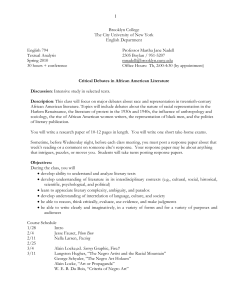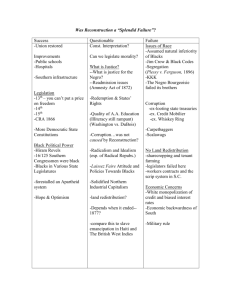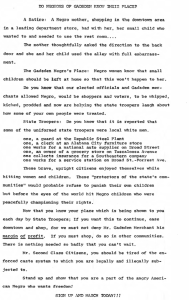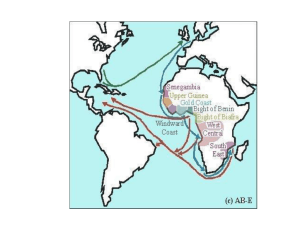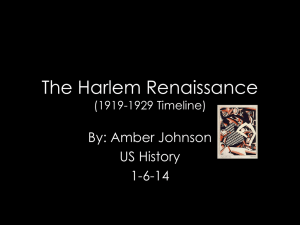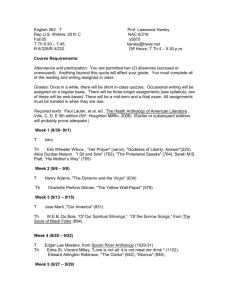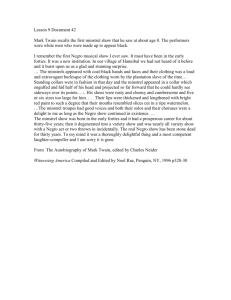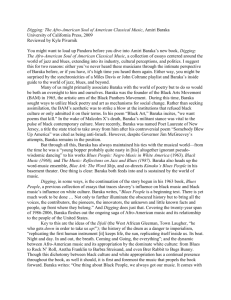here
advertisement
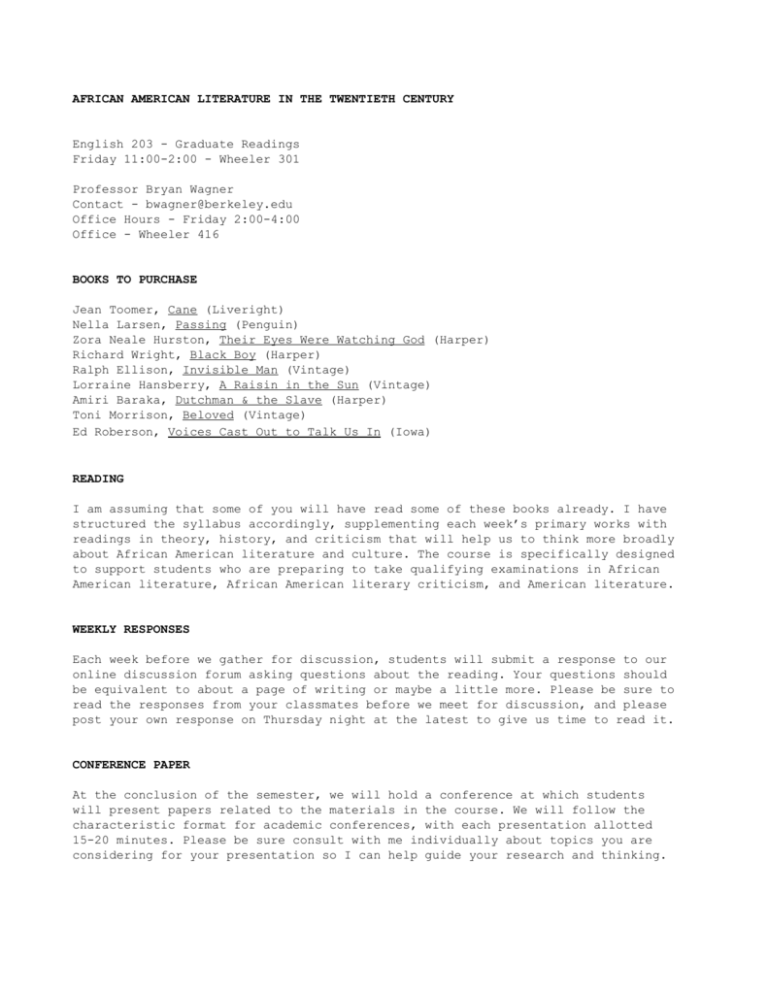
AFRICAN AMERICAN LITERATURE IN THE TWENTIETH CENTURY English 203 ­ Graduate Readings Friday 11:00­2:00 ­ Wheeler 301 Professor Bryan Wagner Contact ­ bwagner@berkeley.edu Office Hours ­ Friday 2:00­4:00 Office ­ Wheeler 416 BOOKS TO PURCHASE Jean Toomer, Cane (Liveright) Nella Larsen, Passing (Penguin) Zora Neale Hurston, Their Eyes Were Watching God (Harper) Richard Wright, Black Boy (Harper) Ralph Ellison, Invisible Man (Vintage) Lorraine Hansberry, A Raisin in the Sun (Vintage) Amiri Baraka, Dutchman & the Slave (Harper) Toni Morrison, Beloved (Vintage) Ed Roberson, Voices Cast Out to Talk Us In (Iowa) READING I am assuming that some of you will have read some of these books already. I have structured the syllabus accordingly, supplementing each week’s primary works with readings in theory, history, and criticism that will help us to think more broadly about African American literature and culture. The course is specifically designed to support students who are preparing to take qualifying examinations in African American literature, African American literary criticism, and American literature. WEEKLY RESPONSES Each week before we gather for discussion, students will submit a response to our online discussion forum asking questions about the reading. Your questions should be equivalent to about a page of writing or maybe a little more. Please be sure to read the responses from your classmates before we meet for discussion, and please post your own response on Thursday night at the latest to give us time to read it. CONFERENCE PAPER At the conclusion of the semester, we will hold a conference at which students will present papers related to the materials in the course. We will follow the characteristic format for academic conferences, with each presentation allotted 15­20 minutes. Please be sure consult with me individually about topics you are considering for your presentation so I can help guide your research and thinking. COURSE SCHEDULE 1­24 Introduction 1­31 Jean Toomer, Cane (1923) Ida B. Wells, Lynch Law in Georgia (1899) W. E. B. Du Bois, “Propaganda of History” (1936) Alain Locke, “The New Negro” (1925) 2­7 Countee Cullen, Color (1925) Claude McKay, Harlem Shadows (1922) Marcus Garvey, “Africa for the Africans” (1921) Arthur Schomburg, “The Negro Digs Up His Past” (1925) W. E. B. Du Bois, “The Negro Mind Reaches Out” (1925) 2­14 Langston Hughes, The Weary Blues (1926) Langston Hughes, Fine Clothes to the Jew (1927) Langston Hughes, “Christ in Alabama” (1931 and 1967) Paul Laurence Dunbar, “When Malindy Sings” and “A Negro Love Song” (1895) James Weldon Johnson, Preface to The Book of American Negro Poetry (1922) Langston Hughes, “The Negro Artist and the Racial Mountain” (1926) George Schuyler, “The Negro­Art Hokum” (1926) 2­21 Nella Larsen, Passing (1929) Lydia Maria Child, “The Quadroons” (1842) W. E. B. Du Bois, “Criteria of Negro Art” (1926) Zora Neale Hurston, “How it Feels to be Colored Me” (1928) Angelina Weld Grimké, “The Black Finger” (1923) and “Tenebris” (1924) 2­28 Zora Neale Hurston, Their Eyes Were Watching God (1937) Richard Wright, “Between Laughter and Tears” (1937) Alice Walker, “In Search of Zora Neale Hurston” (1975) Zora Neale Hurston, “Characteristics of Negro Expression” (1934) Sterling Brown, “Negro Character as Seen by White Authors” (1933) 3­7 Richard Wright, Black Boy (1945; Rev. Ed. 1991) Richard Wright, “Blueprint for Negro Writing” (1937) Richard Wright, “The Ethics of Living Jim Crow” (1937) Irving Howe, “Black Boys and Native Sons” (1963) Ralph Ellison, “The World and the Jug” (1963) 3­14 Gwendolyn Brooks, A Street in Bronzeville (1945) Horace Cayton and St. Clair Drake, “Bronzeville” (1945) E. Franklin Frazier, “In the City of Destruction” (1940) Arthur P. Davis, “Integration and Race Literature” (1956) 3­21 Ralph Ellison, Invisible Man (1952) Hannah Arendt, "Reflections on Little Rock" (1959) Ralph Ellison and Robert Penn Warren, “A Dialogue” (1965) 4­4 Ralph Ellison, Invisible Man (1952) Larry Neal, “And Shine Swam On” (1969) Larry Neal, "Ellison's Zoot Suit" (1973) 4­11 Lorraine Hansberry, A Raisin in the Sun (1959) Norman Mailer, “The White Negro” (1957) James Baldwin, “The Black Boy Looks at the White Boy” (1961) Lorraine Hansberry, “Genet, Mailer, and the New Paternalism” (1961) Adrienne Rich, “The Problem of Lorraine Hansberry” (1979) Harold Cruse, “Lorraine Hansberry” (1967) 4­18 Amiri Baraka, Dutchman (1964) and The Slave (1964) Amiri Baraka, “The Revolutionary Theatre” (1965) Amiri Baraka, “Preface to a Twenty Volume Suicide Note” (1961) Amiri Baraka, “Black Dada Nihilismus” (1964) Frantz Fanon, “The Fact of Blackness” (1952) Audre Lorde, “The Uses of Anger” (1981) 4­25 Toni Morrison, Beloved (1987) Frances Harper, “Slave Mother: A Tale of Ohio” (1859) “A Visit to the Slave Mother Who Killed Her Child” in The Black Book (1974) Angela Davis, “The Black Woman’s Role in the Community of Slaves” (1972) Toni Morrison, “Unspeakable Things Unspoken” (1988) 5­2 Ed Roberson, Voices Cast Out to Talk Us In (1995) M. Nourbese Philip, “Zong #5” and “Zong #6” (2005) Nathaniel Mackey, “Song of the Andoumboulou: 1­7” (1985) Amiri Baraka, Liner Notes to John Coltrane, Live at Birdland (1964) Cecil Taylor, “Sound Structure of Subculture Becoming” (1966) * * * TIME AND LOCATION FOR CONFERENCE PRESENTATIONS TO BE DETERMINED * * * SUPPLEMENTARY READINGS IN THEORY, HISTORY, and CRITICISM WEEK ONE Henry Louis Gates Jr., “The Trope of a New Negro” (1988) Nahum Chandler, “The Problem of the Negro as a Problem for Thought” (2008) Jacquelyn Dowd Hall, “The Mind that Burns in Each Body” (1983) WEEK TWO Brent Hayes Edwards, “The Uses of Diaspora” (2001) David Levering Lewis, “Reading the Harlem Renaissance” (1994) Eric Garber, “The Lesbian and Gay Subculture of Jazz Age Harlem” (1989) WEEK THREE James Snead, “Repetition as a Figure of Black Culture” (1984) Arnold Rampersad, “Langston Hughes’s Fine Clothes to the Jew” (1986) Hazel Carby, “The Sexual Politics of Women’s Blues” (1986) WEEK FOUR Deborah McDowell, “The Nameless Shameful Impulse” (1986; Rev. 1995) Judith Butler, “Passing, Queering: Nella Larsen’s Psychoanalytic Challenge” (1993) Brian Carr, “Paranoid Interpretation and Desire's Nonobject” (2004) WEEK FIVE Henry Louis Gates Jr., “The ‘Blackness of Blackness’” (1983) Hazel Carby, “The Politics of Fiction, Anthropology and the Folk” (1991) George Stocking, “The Basic Assumptions of Boasian Anthropology” (1974) WEEK SIX Cedric Robinson, “Richard Wright and the Critique of Class Theory” (1983) Paul Gilroy, “The Black Atlantic as a Counterculture of Modernity” (1993) Elizabeth Abel, “Bathroom Doors and Drinking Fountains” (1999) WEEK SEVEN Robin Kelley, “We Are Not What We Seem” (1993) Colin Dayan, “Legal Slaves and Civil Bodies” (2001) Anne Cheng, “The Melancholy of Race” (2001) WEEKS EIGHT and NINE Houston Baker, “To Move Without Moving” (1983) Hortense Spillers, “The Idea of Black Culture” (2004) Susan Buck­Morss, “Hegel and Haiti” (2000) WEEK TEN Michael Klarman, “The Plessy Era” (1998) Nikhil Singh, “Rethinking Race and Nation” (2004) Barbara Fields, “Slavery, Race and Ideology in the USA” (1990) WEEK ELEVEN Robin Kelley, “Meditations on History and the Black Avant­Garde” (1997) Kenneth Warren, “Historicizing African American Literature” (2012) Harryette Mullen, “African Signs and Spirit Writing” (1996) WEEK TWELVE Barbara Smith, “Towards a Black Feminist Criticism” (1977) Mary Helen Washington, “The Darkened Eye Restored” (1987) Gayatri Spivak, “Can the Subaltern Speak?” (1988) WEEK THIRTEEN Nathaniel Mackey, “Cante Moro” (1994) Fred Moten, “Resistance of the Object” (2003) Aldon Nielsen, “The Calligraphy of Black Chant” (1997)
